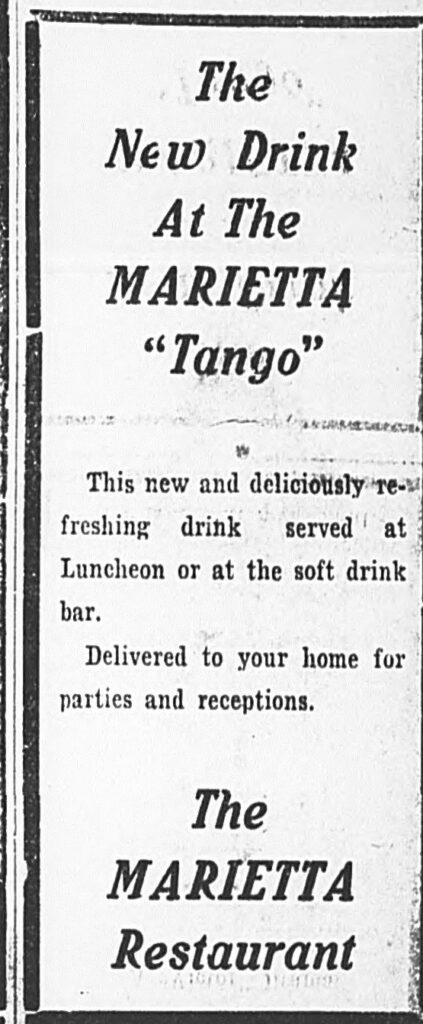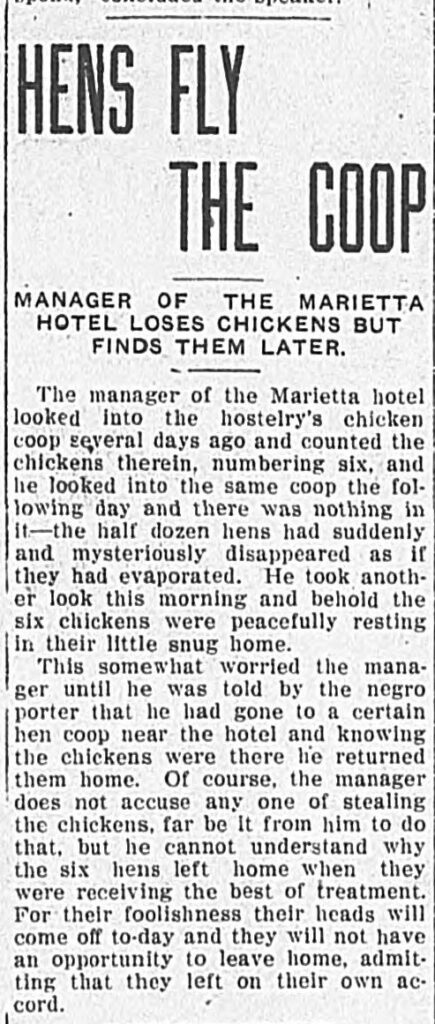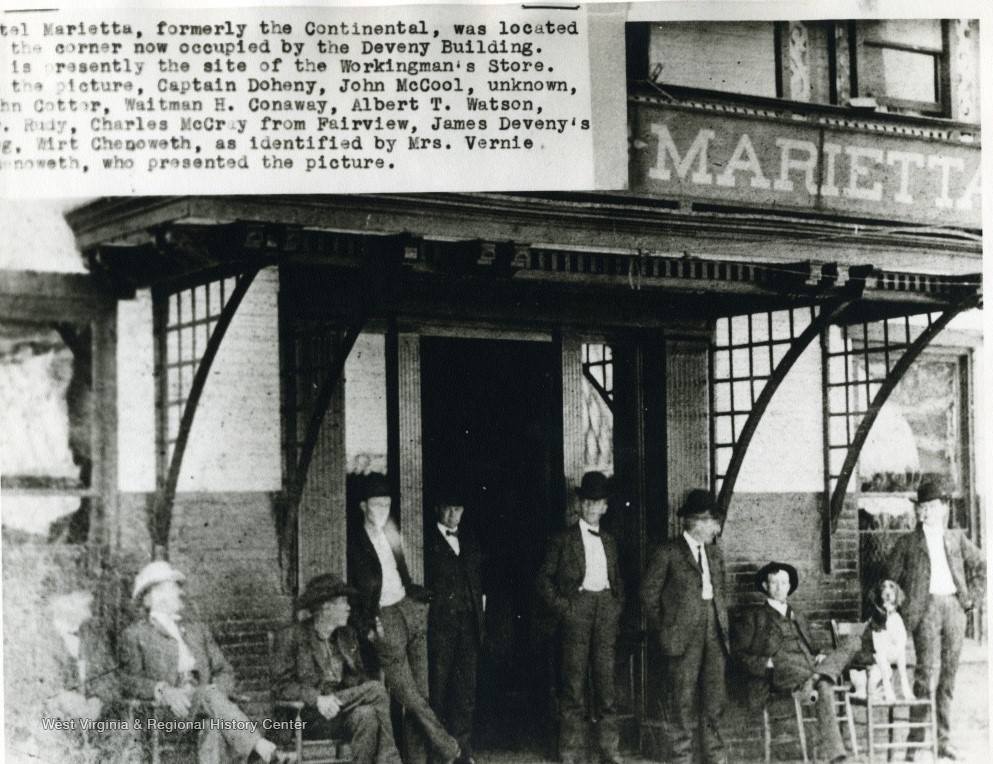
Fairmont, West Virginia, has had many hotels and motels over the years. When the city was at its peak, there were times the visitors coming in competed to get a room. In the early days when Fairmont was called Middletown, new arrivals needed shelter, and the Continental Hotel provided it.
The Continental Hotel was built in 1840. It was a small wooden building that was set on the corner of Main Street and Monroe Street, right in the heart of town. One of the first proprietors was named E. W. Shurtleff. Mr. Shurtleff was a well-respected man in town, and he was a Christian man who taught Sunday school and was later involved in the Women’s Temperance Movement.
Furthermore, he was a smart businessman who, while running the hotel, reared a very successful family. His children were well-known lawyers and teachers.
The Continental did well under his leadership, but in 1875 for the amount of 9,500 dollars, he sold the establishment to Mr. H. S. Coombs. The amount of profit he made was large. The business had a good reputation and was known across the state. Mr. Shurtleff went on to be involved in other businesses and work harder for his church.

Mr. Coombs was a financier and did his best to keep the hotel in tip-top shape and ran it until 1878, when it went to E.L. Basnett, who became the proprietor. From what I have found, Mr. Coombs then became very ill and took his own life to the shock of his family and friends.
Mr. Basnett Esq. hailed from an English family. The citizens of Fairmont described him as the gentlemanly proprietor of the Continental Hotel. He had a head for business and did very well with his venture, and was charitable each year by hosting a dinner for the less fortunate on Christmas Day at the hotel. His servants must have handled this because the hotel had no restaurant.
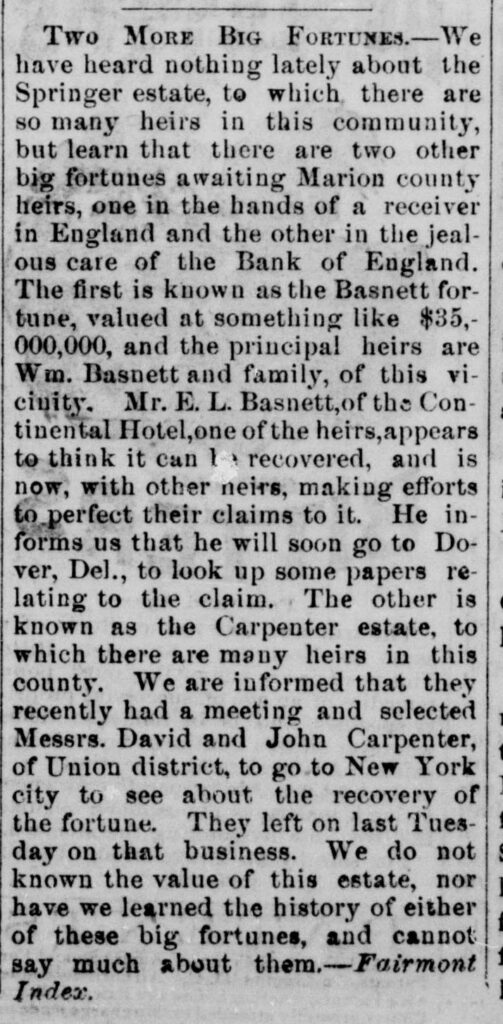
In the local newspaper at the time, called the Fairmont Index, a story ran about the Basnett Fortune and how it came to be. William Basnett, his father, as you can read at the right, thought it was lost, but his son E. L. had hopes of recovering it. This happened in 1880.
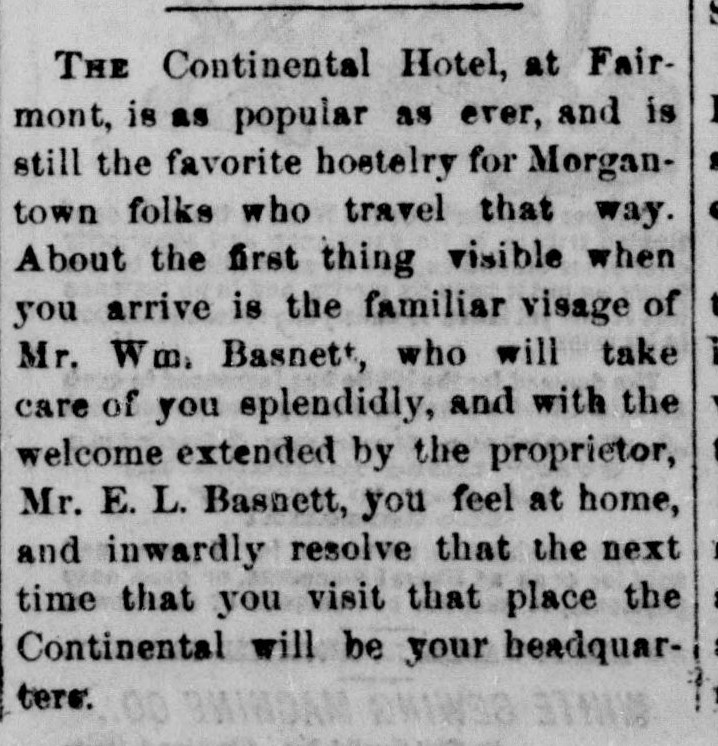
Next in line for the well-known hotel was George W. Manley. He became the proprietor in 1886. Like the others, he was a well-thought-of local person, and his brother was the sheriff of Marion County at the time. While running the hotel, George put his name on the ballot to run for sheriff after his brother became county clerk. From what I can read, the town seemed to think that they needed new blood in the sheriff’s office, and his name was removed from the ballot, and others added. I guess we will never know the whole story. George did put his mark on the hotel, though. Times were advancing, and he purchased a long wagon and a team of horses, decorated it, put the name of the hotel on the side, and made it the first bus bringing people to the hotel.
Sadly, at 64 years old, George passed from this life, having had Typhoid Fever.
The Continental Hotel would get a name change with the next owner, Thomas Augustus Deveney. In Fairmont, citizens recognize this name that goes with a building in our town. The Deveney Building sits on the same site as the Continental and newly named Marietta Hotel. Corner of Adams and Monroe streets.
The Newly named Marietta Hotel was promised to be bigger and better than any other hotel in town. Mr. Deveney came from a hard-working coal mining family and wanted to make his mark. The hotel’s history would have great highs and great lows.
Mr. Deveney was a modern, forward-thinking individual. When he bought the hotel and moved in, he carried with him two pet rattlesnakes: one black and one spotted. I’m sure his employees and guest had fears knowing these were on the premises.
The Marietta soon became the place to get married at. The sitting parlor was richly decorated and made a lovely backdrop for the occasion. Other events, such as salesmen coming into town and putting on shows to sell their wares, happened there also. One such presentation came in when a Phrenologist [ a person who reads and measures bumps on people’s heads ] put on a demonstration in the parlor. He invited people to come and would feel their heads and see if he could predict an illness or help cure one. I bet not too many people took him up on his offer.
Bell Telephone left their wares in the hotel by installing the first six phones in the hallway for patrons to use; then, later, they returned and left phones in each room for the visitor’s convenience. Very modern for the time. Mr. Deveney promised change, and he brought it.
The Elks Organization would hold meetings at the hotel, and fellow members from out of town would be put up there. With the hotel doing great, it only needed a liquor license to sell alcohol legally. Applying was easy, but the wait to be approved was a lot longer. Eventually, it was granted. With alcohol flowing more freely now, the hotel had new problems.
There would be bar fights that destroyed furniture. People drinking too much would fall asleep on the floor at the bar, and trying to move them was next to impossible. Not a good look for a nice hotel. The feel and ambiance soon brought the business down, and patrons stayed less and less.
In comes M.N. Glumicich, who would create a fine dining restaurant in the hotel. His food would draw people in just for meals or customers to the hotel to stay and enjoy. Mr. Glumicich was from Servia and came to this country to prosper and become a U.S. citizen. He had worked hard to get to the point of being able to open a restaurant in such a well-known establishment. The Citizens Dollar Savings Bank knew that he was a man of his word, and he had confirmed that he deserved a high credit rating. Many foreign-speaking people went through town or settled here at this time in the century, and a translator was needed. Mr. Glumicich was this man. He spoke nine different languages and managed the bank’s foreign department.
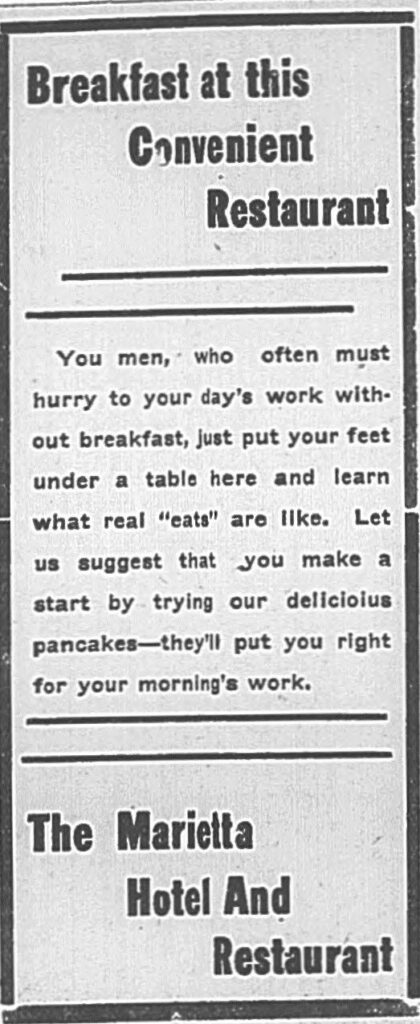
The restaurant did well and was one of the dining establishments in the city. Mr. Deveney was so pleased that the whole business was doing great again and left the day-to-day operation of the hotel and restaurant to Mr. Glumicich.
The hotel was getting bigger and better, and a part of the reading room on the first floor was sectioned off, and three barbers set up their chairs for business.
Everything seemed perfect, but not all was good on the inside. One night the police got word that persons unmarried were co-habitating at the hotel, and that was breaking the law. They raided the hotel and took a few couples away to the jail. The next day they appeared in front of the circuit court and were ordered to pay a ten dollar fine, and never to reside as man and wife unless they were legally married.
It was also well-known that hotel guests would bring moonshine concealed in suitcases and sell it out of their rooms. The Marietta Hotel was on the downside again.
Mr. Deveney, who had owned and run the Marietta Hotel for eleven years, fired Mr. Glumicich for obvious reasons, then leased the hotel to W.B. Woods and Mr. Charles Berns in 1906. The deal was a five-year lease at four thousand dollars a year.
Mr. William Wood and Mr. Charles Bern were well known to have much knowledge of running hotels, so this was a perfect fit. The people working in the hotel were finding it harder and harder to afford other places to reside. Some had been with the hotel for quite a while. Mr. Deveney also owned a garage behind the hotel; atop the garage were apartments. He let these to the employees for a reasonable price. Problem solved. The male citizens of Fairmont seemed to favor sitting outside of the Marietta and socializing. They were witnesses to many accidents on Main Street.
The headline in the West Virginian Newspaper on October 03, 1904, read “Boy Struck Down in Front of Marietta Hotel by Streetcar.”
At age eleven, Walter Martin was riding his bicycle behind a horse-drawn wagon when he crossed the street tracks right in front of an oncoming streetcar. His bad decision had him struck by the number eighteen car. It’s noted that it was the heaviest car on the line. The front of the car struck the bike’s wheel and threw the boy off. Then not being thrown clear of the streetcar, he was struck again and attempted to get up but could not make it. Miraculously he was able to roll away to safety. He was conscious when carried to the Marietta, and Dr. Cook, the founder of Cook Hospital, was called. He came and brought Dr.Hall with him to assess the boy, who was found to have a concussion and was bleeding badly from his head wound. They bandaged the boy well enough to get an ambulance and take him to Cook Hospital. Astonishingly he had no broken bones but was severely bruised. What a lucky lad.
Now let us rejoin our one former proprietor M. N. Glumicich. Even with the problems he had with the hotel guests, he was described as a smart businessman. He grew the business fast. It was found out later how this came about. It was thought he used his own money for the improvements. H.J. Hartley, another very well-known businessman in Fairmont, had loaned Mr. Glumicich the money to make these changes. Apparently, he had signed promissory notes to Mr. Hartley to repay the loan and defaulted on it. Even with Mr. Glumicich nowhere to be found, Mr. Hartley seized all the restaurant equipment and barber instruments for repayment. It was published in the paper that a sale of these items would be held and sold to the highest bidder by cash. Below is the newspaper notice and some of the items published for sale.
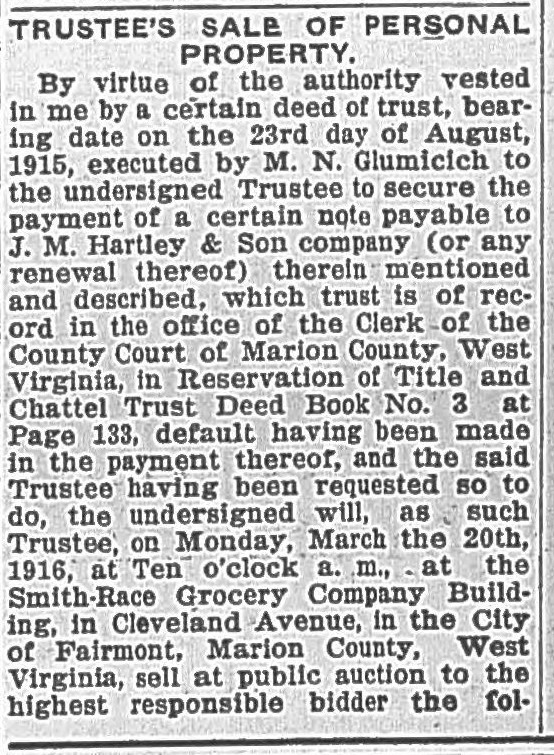
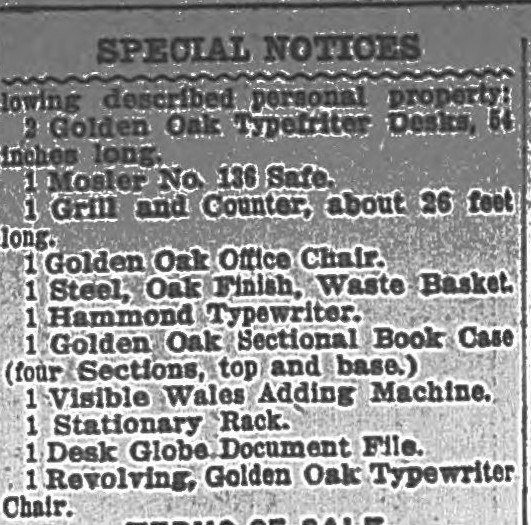
Other items sold were: Oak Dining tables and chairs, National Cas Registers, Oak countertops, Linens, Silverware, pots and pans, three Barber chairs and utensils, carpets, and one leather shoe-shine stand. Almost all items were sold to Mr. D. B. Morley. He was later found to have worked for Mr. J.M. Hartley and was going to open another restaurant in town. For him, this was a bargain.
The Marietta was a wooden structure that needed many repairs, so Mr. Deveney tore it down in 1916 and constructed a new brick building six stories high on the Marietta site. The cost of this venture was stated to be around seventy thousand dollars. There was so much demand to have an office in the new building that he once thought about making it a seven or eight-story building but stopped at six. The Deveney building still stands today in downtown Fairmont. The original facade is hidden behind a newer brick front. Looking at the building reminds us of how far we have come and how our history is still all around us.
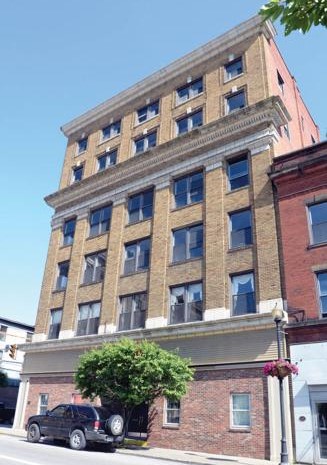
Thank you for reading this blog article about the Hammond Fire-Brick Company, and I hope you enjoyed it. Please, if you would leave a comment below telling me your thoughts, good or bad, about this article or blog. All comments help me to grow and make my blog a better site.
Remember: History is the spine of America; not learning from it would make us collapse and fall!
EXTRAS:
